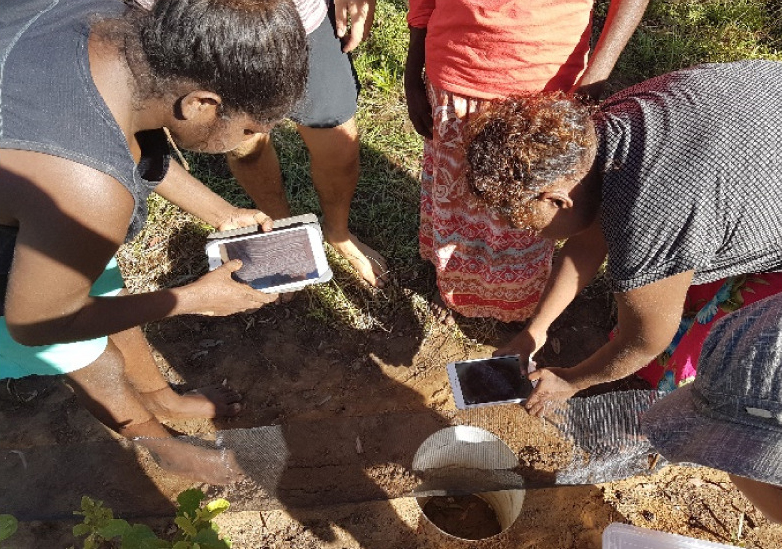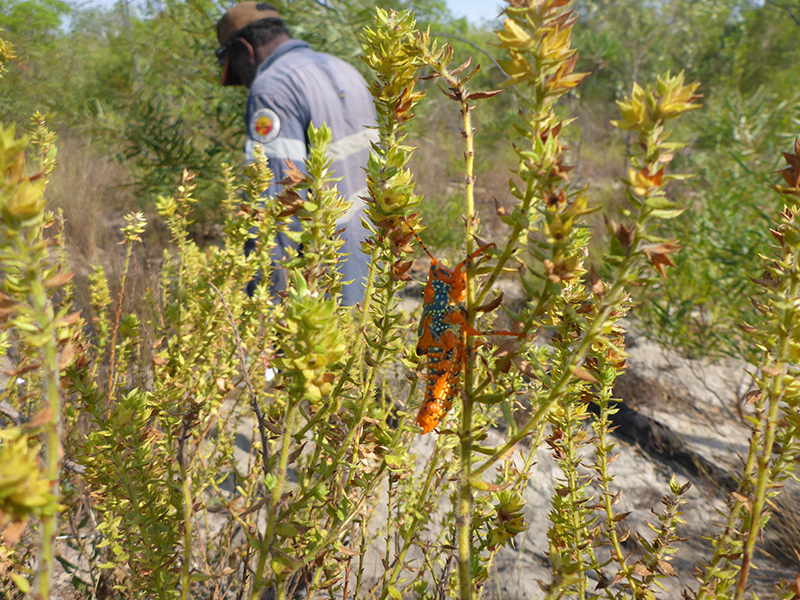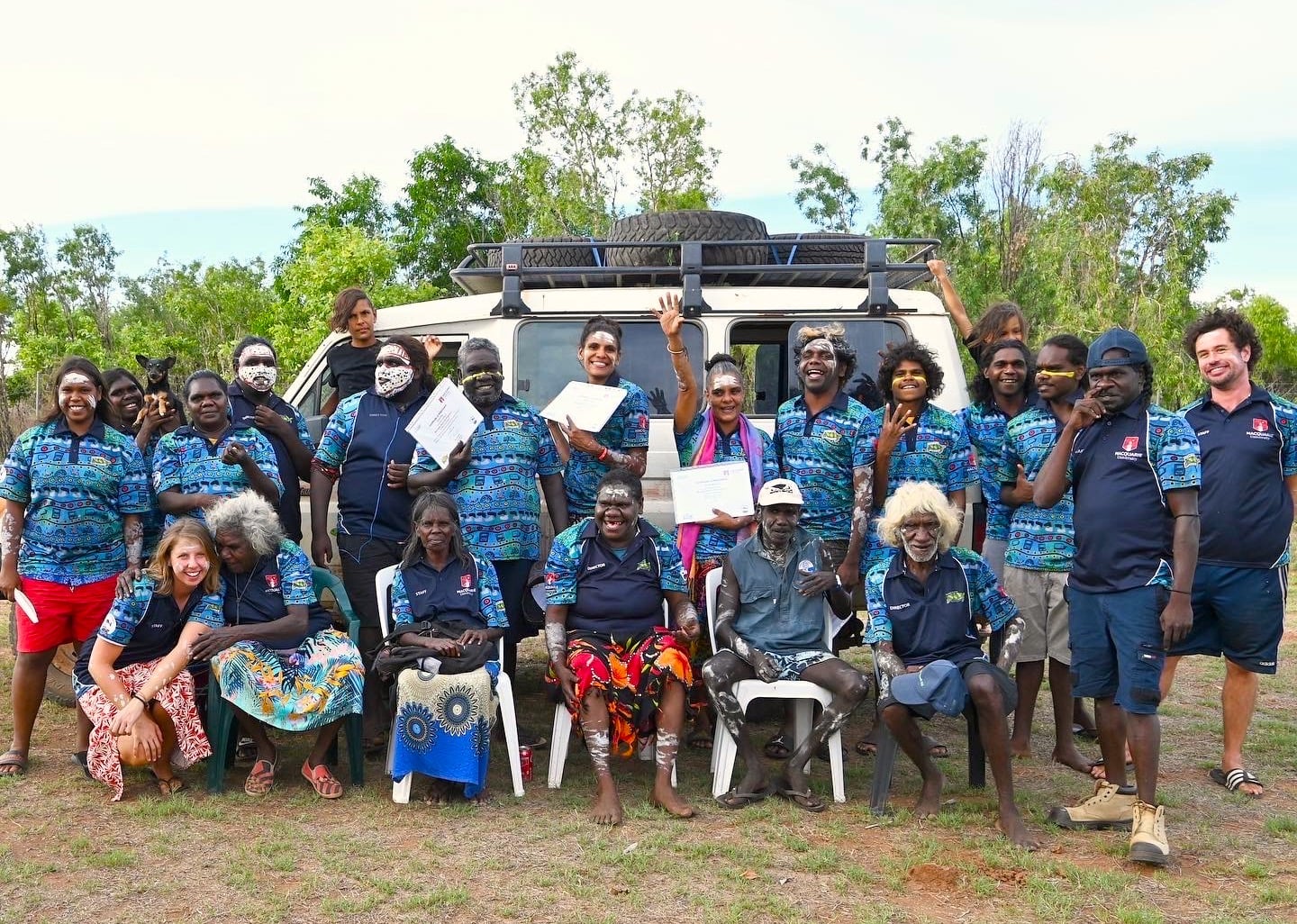Collaborating to protect places and maintain cultures
In northern Arnhem Land, collaborations between Indigenous communities and Macquarie’s ecologists have advanced our understanding of the area’s biodiversity and how to best protect it, and helped maintain local cultural knowledge.

Growing knowledge through sharing knowledge
Macquarie’s Cross-cultural Ecology lab group, led by Associate Professor Emilie Ens, is working closely with remote Indigenous communities in northern Australia’s Arnhem Land to develop new cross-cultural approaches to science and environmental management.
In 2008, Associate Prof. Ens began collaborating with members of the southeast Arnhem Land community of Ngukurr on the co-designed biodiversity survey project, Ngukurr Wi Stadi bla Kantri (We study the Country). The cross-cultural project team won the 2017 Department of Industry, Innovation and Science Eureka Prize for Innovation in Citizen Science.
Since that initial partnership, Macquarie’s researchers have expanded this work with Indigenous communities in North East Arnhem Land. The biocultural benefits have multiplied.
Advancing biodiversity knowledge
Macquarie's partnerships with local organisations and Indigenous rangers have substantially improved biodiversity knowledge in both the South East Arnhem Land Indigenous Protected Area (IPA) and the Laynhapuy IPA of north east Arnhem Land.
By combining Indigenous and Western biodiversity survey methods and data, the project teams have:
- found new populations of near-threatened species of animals, such as the Leichhardt’s grasshopper
- expanded the known range of threatened species,
- and found species of skink previously undescribed by Western science.
 Pictured: a Leichhardt’s Grasshopper nymph found on a Pityrodia shrub during a biodiversity survey.
Pictured: a Leichhardt’s Grasshopper nymph found on a Pityrodia shrub during a biodiversity survey.
Overall, there has been a significant increase in the documented locations of animal species. The team’s discoveries have been added to the Atlas of Living Australia (ALA), making them available for use by community groups, science educators and citizen scientists.
This work has also advanced knowledge of a host of threats to the region’s ecosystems: climate change, weeds, altered fire regimes, depopulation and invasive animals – to name a few. Such knowledge empowers local communities to make better decisions about how they protect the plants and animals on their ancestral clan estates. Many of these species are culturally significant – people have kinship or totemic connections to them.
Maintenance of language and knowledge
The traditional languages and cultural knowledge of Indigenous communities in the South East Arnhem Land IPA are highly endangered.
In Ngukurr, the local project team is working to help reverse this situation. The team has synthesised hundreds of language names and cultural knowledge about plants, animals and places. Inclusion of this linguistic and cultural knowledge in the ALA will help preserve and disseminate it.
Beyond Ngukurr, this biocultural work has expanded to neighbouring communities and Indigenous Protected Areas of Arnhem Land extending to an area of more than 30,000km2. In eastern Arnhem Land alone, Macquarie’s researchers have collaborated with more than 300 Indigenous peoples.
Opportunities for employment
In 2016, the Aboriginal Yugul Mangi Rangers (local to the Ngukurr community) and Associate Prof. Ens established the Yangbala Ranger Group. This group employs young Aboriginal people to work on the Ngukurr Wi Stadi bla Kantri project on-Country, empowering them with both work ready skills and traditional biocultural knowledge.
The project as a whole has employed over 100 people from remote Indigenous communities.
Additionally, many young people from the Yangbala Ranger Group have gone on to study at the Wuyagiba Study Hub. Some have continued their studies at Macquarie, becoming the first university students from the Ngukurr community in more than 35 years.
The Wuyagiba Study Hub
In 2018, after the success of the Yangbala Ranger Group, Macquarie partnered with the Wuyagiba Bush Hub Aboriginal Corporation to develop the Wuyagiba Study Hub.
 Pictured: Wuyagiba Study Hub's 2021 graduates
Pictured: Wuyagiba Study Hub's 2021 graduates
Located in remote south east Arnhem Land between the Aboriginal communities of Ngukurr and Numbulwar, the Hub offers students a unique two-way on-Country pre-Uni education pathway. Indigenous students from Arnhem Land and further afield study courses in both Indigenous cultural knowledge and skills, and academic and professional skills.
Taught by community Elders and Macquarie academics, students learn in a culturally supportive environment. The knowledge and skills they attain will ultimately contribute to the workforce needs of their home communities.
The Hub is helping to close the region’s almost-35-year Higher Education gap.
To date, the initiative has:
- supported over 200 students
- graduated 100 students, including the 2021 graduates pictured above
- seen 28 students enrol in Macquarie University courses. Macquarie’s Indigenous engagement service, Walanga Muru, supports these students throughout their studies.
The success of the Hub has led to interest in adopting a similar program by communities in western and north eastern Arnhem Land, Borroloola and Cape York.
Key partners
School of Natural Sciences
Macquarie University NSW 2109